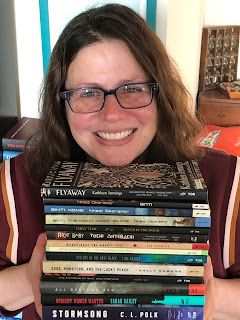Jenny recaps our first virtual school visit from author Gene Luen Yang.
From Jenny: Here at Boswell we love bringing students and authors together for school visits. Authors talk about their journey to becoming a published writer, which usually started when they were kids. They mention what inspires them to write and the research they did on their book, and they tell students about hundreds of other interesting things ranging from Dakota Territory in the 1850s to rain forests to sled dog racing to how to craft a newspaper article. Since the cancellation of all our spring in-person events, we’ve been working with schools and publishers to make visits virtual.
Students at one local school had an opportunity to virtually meet award-winning, New York Times bestselling author and artist Gene Luen Yang over, and I got a chance to follow along.
Here’s my take away from his presentation on Dragon Hoops, a graphic memoir about Yang's life, his family, and the high school where he taught for seventeen years.
At Bishop O'Dowd High School, basketball is all anyone can talk about. The men’s varsity basketball team, the Dragons, is having a phenomenal season that’s been decades in the making. Each victory brings them closer to their ultimate goal: the California State Championships.
Gene Luen Yang never thought he’d spend five years of his life writing and drawing about basketball. He hated basketball as a kid, and because he never paid attention to where the ball was, he almost always ended up getting hit on the head. So he grew up imagining there was a wall in between him and basketball. Until the day basketball started invading his life.
First, his son joined the basketball team. And then it seemed like basketball was everywhere. Writers like Kwame Alexander wrote YA about basketball, and Asian American player Jeremy Lin became a star with the New York Knicks.
So, Gene decided to learn more about the sport, but at the school where he taught, the “nerdy teachers” like Gene (computer science), didn’t hang out with the PE teachers and coaches. So it took effort, but eventually he became friends with the boys’ basketball coach. Lou Richie was the first African American head coach at Bishop O'Dowd High School. Through their friendship, not only did Gene begin to grasp the importance of basketball in the context of American History, but he also found out that watching a game could be thrilling!
Gene spoke to students about the importance of stepping out of your comfort zone and getting to know folks who on the surface you think are different than you. He learned that Lou loved books, and that he was so great at memorizing sports statistics that other kids used to call him “The Professor.” Turned out the basketball coach was a nerd, too - a nerdlete!
By following the team for one season, Gene found out how sports are a source of stories, and he discovered there are parallels between sports and the superhero comics he loved. Both are people in costumes doing superhuman feats. But the difference is that in comics, you know the outcome. Superman always wins. But even the best sports teams sometimes lose. Pretty big stakes for a young person. He was so impressed that the students on the basketball team were willing to step into uncertainty. Gene follows this theme of being brave enough to step into the unknown over and over in his book.
Do the Dragons end up winning the California State Championships? As Gene said, “Read the book and find out!”
Questions from students & teachers:
QUESTION: What has been the international response to your books?
GENE: The book I’m most well known for is American Born Chinese, and that’s been translated into a bunch of languages. So, the response has been really positive!
QUESTION: What is the main message you hope your readers are going to take away from Dragon Hoops?
GENE: Lou [Gene’s friend, the basketball coach] was a history major and was always talking about history. He said “that things that happened in the past still affect us today.” In order to move forward, we need to have a deep understanding of what happened before... One of the lessons we can learn from World War II is that sooner or later the crisis is going to end, and it’s going to be time to rebuild, and you need to rebuild well or you’ll see the ramifications last for decades... What does it mean for us to rebuild fairly and rebuild justly?
QUESTION: What are you working on now? And what are you reading now?
GENE: I’m in a weird spot where I’m putting together proposals and ramping up promotion for [the new comic, on sale May 12th] Superman Smashes the Klan. And right now I’m reading a graphic novel called Check Please by Ngozi Ukazu, which is about a college hockey team. It’s super fun.
QUESTION: Do you have any interest in recreating some of the Chinese classics? How much has Chinese lit influenced your work?
GENE: I did a series for DC Comics called New Superman which is about a Chinese Superman, a kid in Shanghai who inherits some of Clark Kent’s powers, and one of the side characters has heavy ties into The Legend of Lady Whitesnake, a really famous Chinese story. I have thought about doing straight up adaptations of Chinese literature, but my feeling is that a lot of that’s been done, and it’s been done really well by Chinese cartoonists... Maybe the best approach is to find the best adaptations in the Chinese market and translate them into English.
Is your school interested in hosting a virtual author event? Would you like to set up an in-person author visit once school is back in session? Please contact Jenny and I’ll add you to my distribution list.




























